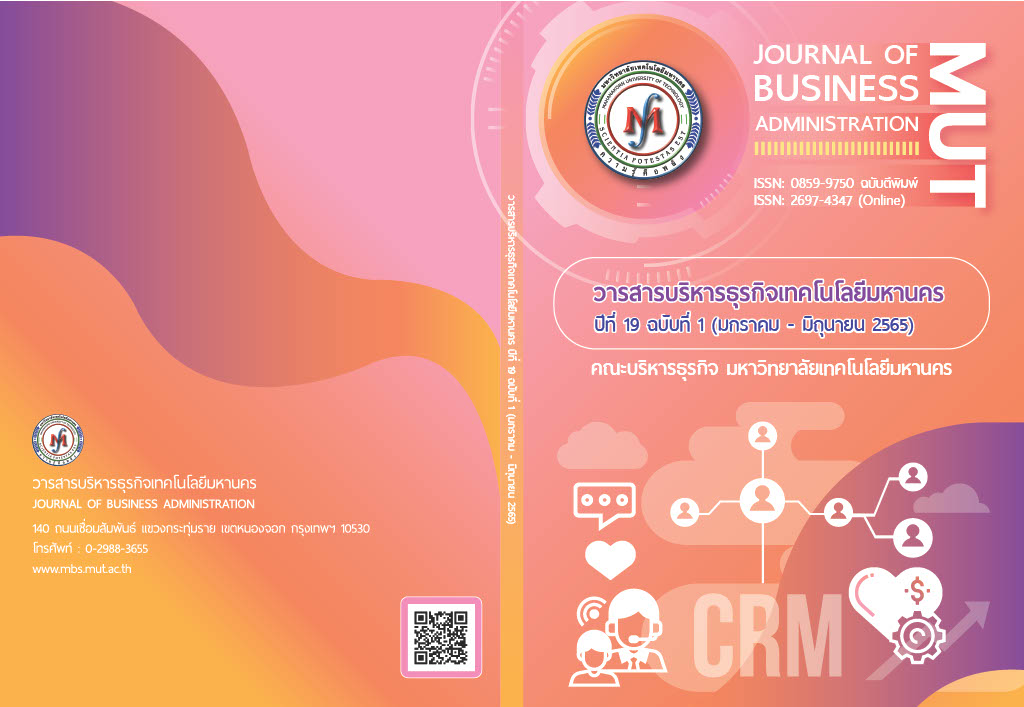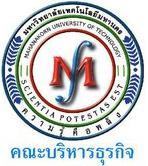Teaching and Learning with Business Simulation Game in Accounting Corresponding to Expected Learning Outcomes
Keywords:
Business Simulation Games, Teaching and Learning, Expected Learning OutcomesAbstract
Teaching the theoretical business processes in the classroom lays basic knowledge of business processes however; the students are still unable to create true business process concepts as when they run a business on their own. Even if the teacher encourages the students to do business on their own, they may not be able to fully learn business processes due to the time constraints. Therefore, the use of tools such as business simulation games based on time simulation in teaching and learning allows students to create business process concepts covering critical processes that occur in real business in the short term, from learning and practicing through direct experience to visualize business processes and enjoying business process activities. It can also create situations for students to encounter business strategy problems and practice finding solutions. Besides, to the students can apply the business concepts gained from playing games to other courses. The application of business simulation games in teaching is recognized as being more effective than the traditional lecture-based instructional approach. This article presents the application of business simulation games for teaching specific courses in accounting. Moreover, it provides guidelines for evaluating the learning outcomes in practice.
References
สุวดี เหมือนอ้น. 2565. การปรับเปลี่ยนกระบวน. สืบค้นวันที่ 16 พฤษภาคม 2565 จาก https://www.mhesi.go.th/index.php/all-media/infographic/7315-650505general1.html
Acctwork. 2013. Home. Retrieved April 3, 2022 from https://home.acctwork.com/
Anderson, Lorin W., Krathwohl, David R. & Bloom, Benjamin S. 2001. A Taxonomy for Learning, Teaching, and Assessing: A Revision of Bloom’s Taxonomy of Educational Objectives. Complete ed. Longman.
Anderson, Philip H., & Lawton, Leigh. 2009. Business Simulations and Cognitive Learning: Developments, Desires, and Future Directions. Simulation & Gaming. 40 (2) 193 - 216. Doi:10.1177/1046878108321624
Azawi Al, Rula, Bulshi, Mazin & Farsi, Fatma. 2016. Educational Gamification vs. Game Based Learning: Comparative Study. International Journal of Innovation, Management and Technology (IJIMT). 7. 131 - 136. Doi:10.18178/ijimt.2016.7.4.659
Bloom, Benjamin S. 1956. Taxonomy of educational objectives: The classification of educational goals. New York: Longmans, Green.
Brown, Julie K. 2008. Student-centered instruction: Involving students in their own education. Music Educators Journal. 94 (5) 30 - 35.
Contessotto, Christine. 2018. The introduction and assessment of a business simulation game. AFAANZ Early Educator Forum. November 2018.
Demeter ICT. 2019. UX / UI คืออะไร? Retrieved April 3, 2022 from https://www.dmit.co.th/th/ข่าวสาร/ux-vs-ui/
Durso, Samuel & Reginato, Luciane & Cornacchione, Edgard. 2020. Gamification in accounting and Students' Skillset. Advances in Scientific and Applied Accounting, 12. Doi:10.14392/ASAA.2019120305.
eLearning Industry. 2022. Top Gamification Learning Management Systems (2022). Retrieved April 3, 2022 from https://elearningindustry.com/top-gamification-lms-software-learning-management-systems
Gijbels, David, Dochy, Filip, Van den Bossche, Piet & R.Segers, Mien. 2005. Effects of Problem-Based Learning: A Meta-Analysis from the Angle of Assessment. Review of Educational Research, 75, 27 - 61. Doi:10.3102/00346543075001027
Goi, Chai-Lee. 2019. The use of business simulation games in teaching and learning. Journal of Education for Business. 94 (5) 342 - 349. DOI: 10.1080/08832323.2018.1536028
Ihsan, Siti Normaziah & Abdul Kadir, Tuty Asmawaty. 2018. Adoption of Software Development Life Cycle (SDLC) Model in Games Development Framework for Serious Games Applications. Advanced Science Letters. 24. 7300 - 7304 Doi:10.1166/asl.2018.12932
Jonathan, Leong & Laik, Ma. 2019. Using Experiential Learning Theory to Improve Teaching and Learning in Higher Education. European Journal of Social Science Education and Research. 6 123 - 132. Doi:10.26417/ejser.v6i1
Lacruz, Adonai Jose, & Américo, Bruno Luiz. 2018. Debriefing's Influence on Learning in Business Game: An Experimental Design. Brazilian Business Review. 15 (2) 192 - 208. Doi:10.15728/bbr.2018.15.2.6
Lim, Donald & Rubasundram, Geetha A. 2018. Disruption in teaching & learning: experiential learning and gamification in practice. Electronic Journal of Business & Management, 1, 87 – 93.
Maneerattanasak, Urairat. 2021. Digital Game-Based Pedagogy: Teachers' Perspectives, 2021. The 6th International STEM Education Conference (iSTEM-Ed) 2021. pp. 1-4.
Maneerattanasak, Urairat., Shotelersuk, Voraluk., Prakhongsee, Sujittra., Keawchan, Piyawan. & Leerattanachai, Surat. 2020. The Design of Learning Business and Accounting Process through Online Game for Learning Outcomes for Technical Competence. Proceedings of the 7th National and International Conference on Administration and Management. Mahanakorn University of Technology, Bangkok, THAILAND, February 24 - 25, 2020 36 - 46.
Mohd Yatim, Shafudin & Goh, Chin & Mohamad, Raihanatul. 2018. Factors Influencing Use of Monsoonsim Business Simulation by UTM Undergraduate Students. International Journal of Learning and Development, 8, 61. Doi:10.5296/ijld.v8i2.13073
MonsoonSIM. 2021. About Us. Retrieved April 3, 2022 from http://www.monsoonsim.com/
Morin, Jennifer, Tamberelli, Frank & Buhagiar, Tarek. 2020. Educating business integrators with a computer-based simulation game in the flipped classroom. Journal of Education for Business, 95 (2) 121 - 128. DOI: 10.1080/08832323.2019.1613951
Morris, Thomas H. 2020. Experiential learning – a systematic review and revision of Kolb’s model. Interactive Learning Environments. 28 (8) 1064 - 1077. DOI: 10.1080/10494820.2019.1570279
Park, C. Whan, Gardner, Meryl P. and Thukral, Vinod K. 1988. Self-Perceived Knowledge: Some Effects on Information Processing for a Choice Task. The American Journal of Psychology. 101 (3) 401 - 424.
Salika.co. 2021. Vonder: อีกขั้นของ EdTech ไทย คือใช้ Gamifi ตีตลาดโลก. Salika Knowledge Sharing Space. Retrieved April 3, 2022 from https://www.salika.co/2021/02/19/vonder-thai-edtech/
Sugahara, Satoshi & Lau, David. 2018. The effect of game-based learning as the experiential learning tool for business and accounting training: A study of Management Game. Journal of Education for Business. 94 1 - 9. Doi:10.1080/08832323.2018.1527751
Welbers, Kasper, Konijn, Elly A., Eden, Allison, and Brugman, Britta C. 2019. Gamification as a tool for engaging student learning: A field experiment with a gamified app. E-Learning and Digital Media. 16 (2) 92 - 109.
Wongpinunwatana, Nitaya & Maneerattanasak, Urairat. 2020. Gamification as a Tool for Enhancing Student Understanding in Business Processes: An Experimental Research. Journal of Southwest Jiaotong University. 55 (1) 1 - 13.
Tan, Jayarani and Sockalingam, Nachamma. 2015. Gamification to Engage Students in Higher Education. 1 - 14. Research Collection Lee Kong Chian School of Business. Retrieved April 3, 2022 from https://ink.library.smu.edu.sg/lkcsb_research/4740
Yusoff, Amri & Crowder, Richard & Gilbert, Lester & Wills, Gary. 2009. A Conceptual Framework for Serious Games. 2009 Ninth IEEE International Conference on Advanced Learning Technologies. 21-23. Doi:10.1109/ICALT.2009.19
Downloads
Published
Issue
Section
License

This work is licensed under a Creative Commons Attribution-NonCommercial-NoDerivatives 4.0 International License.
ข้อความ ข้อคิดเห็น ข้อมูล เนื้อหา รูปภาพ แผนภูมิ แผนผัง เป็นต้น ที่ปรากฏและแสดงในบทความต่างๆ ในวารสารบริหารธุรกิจเทคโนโลยีมหานคร ถือเป็นความรับผิดชอบโดยตรงของผู้เขียนบทความนั้นๆ มิใช่เป็นความรับผิดชอบใดๆ ของวารสารบริหารธุรกิจเทคโนโลยีมหานคร และมหาวิทยาลัยเทคโนโลยีมหานคร
บทความที่ตีพิมพ์ในวารสารบริหารธุรกิจเทคโนโลยีมหานคร ถือเป็นลิขสิทธิ์เฉพาะของคณะบริหารธุรกิจ มหาวิทยาลัยเทคโนโลยีมหานคร หากบุคคลหรือหน่วยงานใดต้องการนำทั้งหมดหรือส่วนใดส่วนหนึ่งไปเผยแพร่ต่อหรือเพื่อกระทำการใดๆ จะต้องได้รับการอนุญาตเป็นลายลักษณ์อักษรจากคณะบริหารธุรกิจ มหาวิทยาลัยเทคโนโลยีมหานครก่อนเท่านั้น


